The Covid Divide: The pandemic has plunged some into poverty, and boosted savings for others
By Jeanne Sahadi, CNN Business
Updated Thu December 10, 2020
For many Americans, the economic effects of the pandemic have been devastating. Millions have lost jobs. Food and housing insecurity has soared. And roughly half of US households reported a drop in income this year, according to Bankrate.com.
Life will get worse for them if they don't get more financial help or paying work soon.
But others -- lucky enough to keep their jobs and even work from home -- have ended up financially better off, or at least unaffected, thanks to such factors as a rising stock market, increased savings, or a boost in demand for their business.
He never imagined he'd be in this situation
Unfortunately, Barnell Garrett finds himself in the "worse off" category.
In March, his job as a hotel sales manager in Seattle disappeared -- first through a furlough, then a permanent layoff.
Garrett's unemployment benefits expire at the end of December, and he doesn't know if he'll qualify for an extension. His health insurance costs are now $641 a month, well above the $150 he was paying when his employer subsidized his premiums. He's considering withdrawing about $25,000 from his 401(k) to pay off the extra credit card debt he accrued during the pandemic to pay for groceries and insurance, as well as a private loan he took out a few years ago.
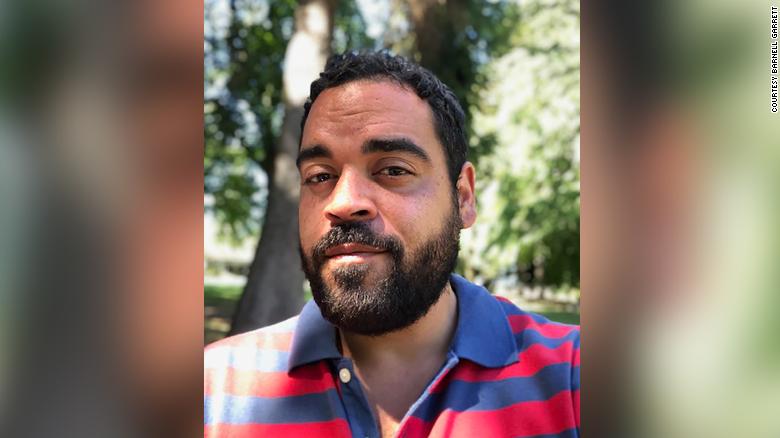
Laid off from his hotel sales job, Barnell Garrett says he can only pay his bills through January.
He says he can pay his bills through January, but if he doesn't get help soon, he will have to move in with his mother if he can't find a much cheaper place to live. Now approaching 40, he never imagined he'd be in this situation.
Garrett said he doesn't expect the hotel industry, where he's built his career, to bounce back quickly so he's looking at other industries for a job. He's willing to take a pay cut, but is shocked at how low the pay on offer is -- even when an employer requires a college degree and years of experience.
"Several of the jobs I interviewed for initially looked like good-paying jobs, but during the interview I learned that they pay barely above Seattle's $15 minimum wage and are lower than my monthly unemployment," Garrett said.
Her 401(k) is already tapped out
This year, she lost her job in property management, drained her 401(k) and has been collecting unemployment benefits and food stamps.
She's behind on rent and worries she'll be evicted in January if her landlord can't secure rental subsidies from the state.
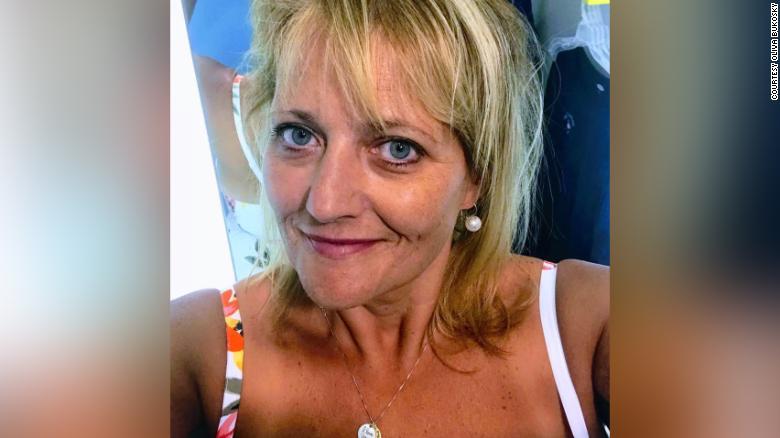
Olivia Bukosky went from middle class working mom last year to living off food stamps and unemployment benefits this year.
If that happens, Bukosky said, she'll either have to stay with friends or move back to the home she still co-owns with her husband, whom she is divorcing. "But it's not a good environment."
She wishes the divorce could proceed, but that will have to wait. "I cannot collect alimony until we go to court. I can't afford a lawyer and Legal Aid will not even look at divorces until the pandemic is over," she said.
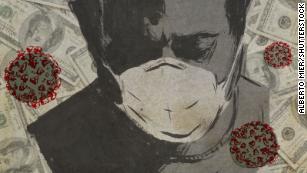
'Tired of being sad.' The financial stress from Covid is taking an emotional toll
Like Garrett, Bukosky is also looking for work outside her chosen field. She's been applying for jobs and even getting interviews, but so far no offers. "I'm looking for everything. I just need to work."
She has friends to lend emotional support, but she's hesitant to open up. "A friend reached out today and I didn't want to tell him how I was doing because I didn't have anything good to say. I'm like a broken record," Bukoski said. "It's just been a terrible year."
Humbled by how lucky they've been
The economic story has been very different for folks like real estate lawyer Paul Levine, veterinarian Danielle Sawyer, and adventure travelers Michael and Melissa Harlow.
While he doesn't know yet whether his total revenue this year will top last year's, he expects it may. And even if it didn't, he still considers himself better off financially because the money that he's saved from not traveling or going out to eat has gone toward his savings and paying bills.
"I feel humble and thankful that I can pay my mortgage and pay for my household expenses," Levine said.
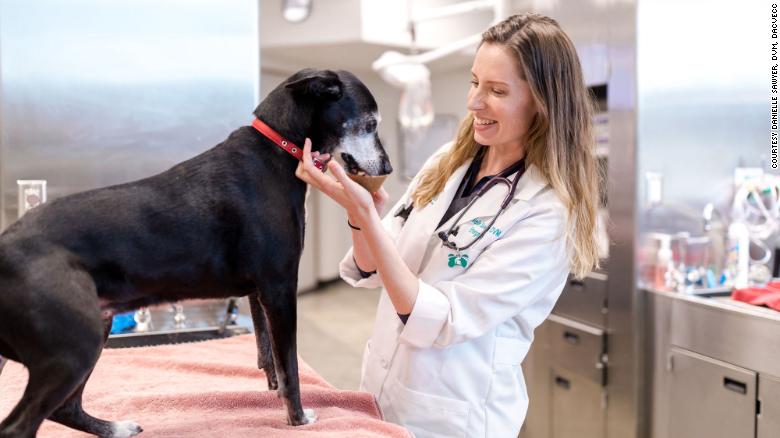
A surge of pet adoptions during the pandemic has meant a lot more business for veterinarians like Danielle Sawyer.
Sawyer's veterinary practice has seen a 50% uptick in clients because so many people have gotten dogs during the pandemic. It's also because many have done so via Craigslist or through unscrupulous breeders online and they end up with pets who are sick and need medical care. "It's been like one long day for us," Sawyer said.
But it's also meant she's had the best year financially since becoming a vet. And that has helped her pay down her school debt and buy the condo she and her toddler daughter now live in.
For empty nesters Michael and Melissa Harlow, the pandemic affirmed the wisdom of their decision years ago to pay off debt and downsize their belongings so they could quit their corporate jobs. While they still need to work so they don't have to touch their retirement savings, they do so in ways tied to their love of adventure.
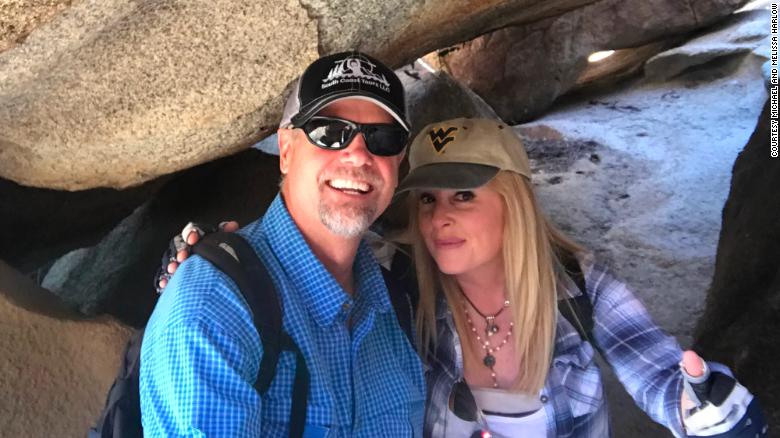
Michael and Melissa Harlow's RV rental business did well this summer as people sought Covid-safe ways to travel.
For instance, they run an online rental RV service. Business this summer was very good as people sought to find Covid-safe ways to travel, they said. Melissa also works as a freelance voice over artist, which she does from a studio she created in the guest house they rent on a ranch near San Diego.
Also, they noted, their savings have increased because they are spending less on travel and other activities this year.
"I'm grateful we bit the bullet for so many years (downsizing). It was worth the pain ... to be where we are now," Melissa said.
Financially steady, but not unaffected
For some people, the pandemic has meant neither boon nor bust.
Originally from the Netherlands, Jan Jansen, a retired physician, and his wife, Catharine, moved to Santa Fe a few years ago, after decades of living and working in Indianapolis.
Their income has remained steady -- thanks in part to a rising stock market. And they've ended up spending less because they aren't able to go to restaurants or travel. Instead, they're donating to food banks and giving money through their church.
"It's sad to see how a country can completely fail its population,"Jansen said.
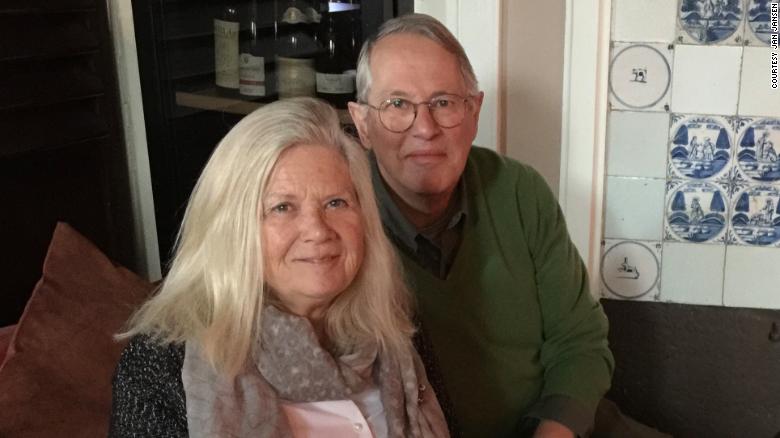
Retiree Jan Jansen, with his wife Catharine, misses traveling to see family but feels fortunate the pandemic hasn't hurt their income.
The main thing they've lost, Jansen said, is a year of their lives. "Our main problem is a lost year, which counts more when your horizon becomes shorter."
Meanwhile, federal government employee Leigh Ramunni in Massachusetts said she has lost family members to Covid-19. But she is grateful she didn't lose her job and can work from home, since her husband is no longer working due to a disability.
Ramunni noted that she has stocked up on food for six months because she has asthma and tries not to go out much. But she is also donating more -- both in terms of money and food.
"We're lucky to have more, so we have given more," she said. "We count ourselves blessed, but also pray for something positive to emerge... As a rich and powerful nation, we should not have food lines and evictions during a pandemic."
By Jeanne Sahadi, CNN Business
Updated Thu December 10, 2020
For many Americans, the economic effects of the pandemic have been devastating. Millions have lost jobs. Food and housing insecurity has soared. And roughly half of US households reported a drop in income this year, according to Bankrate.com.
Life will get worse for them if they don't get more financial help or paying work soon.
But others -- lucky enough to keep their jobs and even work from home -- have ended up financially better off, or at least unaffected, thanks to such factors as a rising stock market, increased savings, or a boost in demand for their business.
He never imagined he'd be in this situation
Unfortunately, Barnell Garrett finds himself in the "worse off" category.
In March, his job as a hotel sales manager in Seattle disappeared -- first through a furlough, then a permanent layoff.
Garrett's unemployment benefits expire at the end of December, and he doesn't know if he'll qualify for an extension. His health insurance costs are now $641 a month, well above the $150 he was paying when his employer subsidized his premiums. He's considering withdrawing about $25,000 from his 401(k) to pay off the extra credit card debt he accrued during the pandemic to pay for groceries and insurance, as well as a private loan he took out a few years ago.

Laid off from his hotel sales job, Barnell Garrett says he can only pay his bills through January.
He says he can pay his bills through January, but if he doesn't get help soon, he will have to move in with his mother if he can't find a much cheaper place to live. Now approaching 40, he never imagined he'd be in this situation.
Garrett said he doesn't expect the hotel industry, where he's built his career, to bounce back quickly so he's looking at other industries for a job. He's willing to take a pay cut, but is shocked at how low the pay on offer is -- even when an employer requires a college degree and years of experience.
"Several of the jobs I interviewed for initially looked like good-paying jobs, but during the interview I learned that they pay barely above Seattle's $15 minimum wage and are lower than my monthly unemployment," Garrett said.
Her 401(k) is already tapped out
Olivia Bukosky said last year she was a working mom living a middle class life in Owings Mills, Maryland.
This year, she lost her job in property management, drained her 401(k) and has been collecting unemployment benefits and food stamps.
She's behind on rent and worries she'll be evicted in January if her landlord can't secure rental subsidies from the state.

Olivia Bukosky went from middle class working mom last year to living off food stamps and unemployment benefits this year.
If that happens, Bukosky said, she'll either have to stay with friends or move back to the home she still co-owns with her husband, whom she is divorcing. "But it's not a good environment."
She wishes the divorce could proceed, but that will have to wait. "I cannot collect alimony until we go to court. I can't afford a lawyer and Legal Aid will not even look at divorces until the pandemic is over," she said.

'Tired of being sad.' The financial stress from Covid is taking an emotional toll
Like Garrett, Bukosky is also looking for work outside her chosen field. She's been applying for jobs and even getting interviews, but so far no offers. "I'm looking for everything. I just need to work."
She has friends to lend emotional support, but she's hesitant to open up. "A friend reached out today and I didn't want to tell him how I was doing because I didn't have anything good to say. I'm like a broken record," Bukoski said. "It's just been a terrible year."
Humbled by how lucky they've been
The economic story has been very different for folks like real estate lawyer Paul Levine, veterinarian Danielle Sawyer, and adventure travelers Michael and Melissa Harlow.
Levine, who works on both residential and commercial real estate deals, initially saw a huge drop off in business from mid-March through mid-May. But ever since, he said, his practice has been "staggeringly busy... There's a lot of money pouring into the market."
While he doesn't know yet whether his total revenue this year will top last year's, he expects it may. And even if it didn't, he still considers himself better off financially because the money that he's saved from not traveling or going out to eat has gone toward his savings and paying bills.
"I feel humble and thankful that I can pay my mortgage and pay for my household expenses," Levine said.

A surge of pet adoptions during the pandemic has meant a lot more business for veterinarians like Danielle Sawyer.
Sawyer's veterinary practice has seen a 50% uptick in clients because so many people have gotten dogs during the pandemic. It's also because many have done so via Craigslist or through unscrupulous breeders online and they end up with pets who are sick and need medical care. "It's been like one long day for us," Sawyer said.
But it's also meant she's had the best year financially since becoming a vet. And that has helped her pay down her school debt and buy the condo she and her toddler daughter now live in.
For empty nesters Michael and Melissa Harlow, the pandemic affirmed the wisdom of their decision years ago to pay off debt and downsize their belongings so they could quit their corporate jobs. While they still need to work so they don't have to touch their retirement savings, they do so in ways tied to their love of adventure.

Michael and Melissa Harlow's RV rental business did well this summer as people sought Covid-safe ways to travel.
For instance, they run an online rental RV service. Business this summer was very good as people sought to find Covid-safe ways to travel, they said. Melissa also works as a freelance voice over artist, which she does from a studio she created in the guest house they rent on a ranch near San Diego.
Also, they noted, their savings have increased because they are spending less on travel and other activities this year.
"I'm grateful we bit the bullet for so many years (downsizing). It was worth the pain ... to be where we are now," Melissa said.
Financially steady, but not unaffected
For some people, the pandemic has meant neither boon nor bust.
Originally from the Netherlands, Jan Jansen, a retired physician, and his wife, Catharine, moved to Santa Fe a few years ago, after decades of living and working in Indianapolis.
Their income has remained steady -- thanks in part to a rising stock market. And they've ended up spending less because they aren't able to go to restaurants or travel. Instead, they're donating to food banks and giving money through their church.
"It's sad to see how a country can completely fail its population,"Jansen said.

Retiree Jan Jansen, with his wife Catharine, misses traveling to see family but feels fortunate the pandemic hasn't hurt their income.
The main thing they've lost, Jansen said, is a year of their lives. "Our main problem is a lost year, which counts more when your horizon becomes shorter."
Meanwhile, federal government employee Leigh Ramunni in Massachusetts said she has lost family members to Covid-19. But she is grateful she didn't lose her job and can work from home, since her husband is no longer working due to a disability.
Ramunni noted that she has stocked up on food for six months because she has asthma and tries not to go out much. But she is also donating more -- both in terms of money and food.
"We're lucky to have more, so we have given more," she said. "We count ourselves blessed, but also pray for something positive to emerge... As a rich and powerful nation, we should not have food lines and evictions during a pandemic."
No comments:
Post a Comment